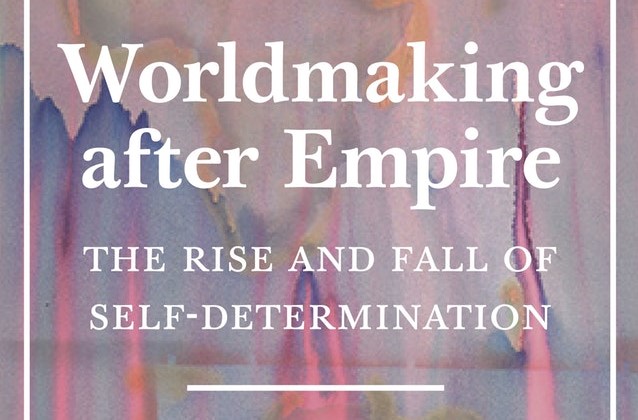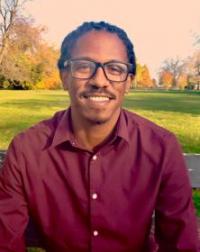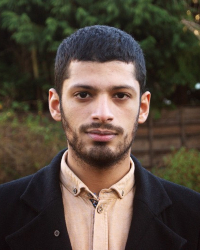Online Roundtable—Worldmaking after Empire: The Rise and Fall of Self-Determination

November 25-29, 2019
Black Perspectives, the award-winning blog of the African American Intellectual History Society (AAIHS), is hosting an online roundtable on Adom Getachew’s Worldmaking after Empire: The Rise and Fall of Self-Determination (Princeton University Press). The author describes it as “a study of the global vision of decolonization Black anticolonial nationalists articulated.”
The roundtable begins on Monday, November 25th and concludes on Friday, November 29th.
The roundtable will feature pieces from Jermaine Scott (Mississippi State University), Annette Joseph-Gabriel (University of Michigan), Musab Younis (Queen Mary University of London), Charisse Burden-Stelly (Carleton College), and Merve Fejzula (University of Missouri). At the conclusion of the roundtable, author Adom Getachew (University of Chicago) will respond.
During the week of the online roundtable, Black Perspectives will publish new blog posts every day at 5:30AM EST. Please follow Black Perspectives (@BlkPerspectives) and AAIHS (@AAIHS) on Twitter; like AAIHS on Facebook; or subscribe to our blog for updates. By subscribing to Black Perspectives, each new post will automatically be delivered to your inbox during the week of the roundtable.
About the Author
Adom Getachew is the Neubauer Family Assistant Professor of Political Science and the College at the University of Chicago. Her research and teaching interests include modern political thought with a focus on the nineteenth and twentieth centuries, the history of international law, theories of empire and race, Black political thought and post-colonial political theory. Her work reconstructs the animating questions, debates and institutional visions anti-colonial nationalists of the Black Atlantic pursued during the height of decolonization. Through the political thought of African, African-American and Caribbean figures such as Nnamdi Azikiwe, W.E.B Du Bois, George Padmore, Kwame Nkrumah, Eric Williams, Michael Manley and Julius Nyerere, Worldmaking illustrates that anti-colonial visions of self-determination were projects of worldmaking that sought to overcome racial hierarchy and institutionalize autonomy and equality within the international order. Follow her on Twitter @AdomGetachew.
About the Participants
 Jermaine Scott is an Assistant Professor of history at Mississippi State University and is currently the Carter G. Woodson Distinguished Postdoctoral Fellow and the University of Virginia. His research interests include the cultural politics of sport, Black politics, Black diaspora studies, and modernity/coloniality theory. His dissertation sought to understand the ways in which Black athletic collectives in the African Diaspora negotiate the colonial and racial constitution of modern sports, and football/soccer in particular. His writings have been included in ESPN’s The Undefeated and the Journal of Sports History, and he is an active member of the American Studies Association’s Sports Studies Caucus. Follow him on Twitter @itsjermaine.
Jermaine Scott is an Assistant Professor of history at Mississippi State University and is currently the Carter G. Woodson Distinguished Postdoctoral Fellow and the University of Virginia. His research interests include the cultural politics of sport, Black politics, Black diaspora studies, and modernity/coloniality theory. His dissertation sought to understand the ways in which Black athletic collectives in the African Diaspora negotiate the colonial and racial constitution of modern sports, and football/soccer in particular. His writings have been included in ESPN’s The Undefeated and the Journal of Sports History, and he is an active member of the American Studies Association’s Sports Studies Caucus. Follow him on Twitter @itsjermaine.
 Annette Joseph-Gabriel is a scholar of contemporary francophone Caribbean and African literature with interdisciplinary specializations in Black transnational feminisms and slavery in the Atlantic world. She is currently an Assistant Professor of French and Francophone Studies at the University of Michigan. Her forthcoming book, Decolonial Citizenship: Black Women’s Resistance in the Francophone World (University of Illinois Press), examines Black women’s articulations of citizenship through their work in anticolonial movements in Francophone Africa and the Antilles. Her articles have appeared in Small Axe, Eighteenth-Century Studies, Slavery & Abolition, Nouvelles Études Francophones, and The French Review. She is managing editor of Palimpsest: A Journal on Women, Gender, and the Black International. Follow her on Twitter @AnnetteJosephG.
Annette Joseph-Gabriel is a scholar of contemporary francophone Caribbean and African literature with interdisciplinary specializations in Black transnational feminisms and slavery in the Atlantic world. She is currently an Assistant Professor of French and Francophone Studies at the University of Michigan. Her forthcoming book, Decolonial Citizenship: Black Women’s Resistance in the Francophone World (University of Illinois Press), examines Black women’s articulations of citizenship through their work in anticolonial movements in Francophone Africa and the Antilles. Her articles have appeared in Small Axe, Eighteenth-Century Studies, Slavery & Abolition, Nouvelles Études Francophones, and The French Review. She is managing editor of Palimpsest: A Journal on Women, Gender, and the Black International. Follow her on Twitter @AnnetteJosephG.
 Musab Younis is a Lecturer in Politics and International Relations at Queen Mary University of London. Younis’ work is located at the intersection of the history of political thought, international relations, and critical theory. His research examines international political thought in relation to empire, with a focus on anticolonialism. He is currently preparing a book manuscript on conceptions of race and global order across the interwar Black Atlantic. He has published articles in journals such as Millenium: Review of International Studies and Nations and Nationalism.
Musab Younis is a Lecturer in Politics and International Relations at Queen Mary University of London. Younis’ work is located at the intersection of the history of political thought, international relations, and critical theory. His research examines international political thought in relation to empire, with a focus on anticolonialism. He is currently preparing a book manuscript on conceptions of race and global order across the interwar Black Atlantic. He has published articles in journals such as Millenium: Review of International Studies and Nations and Nationalism.
 Charisse Burden-Stelly is an Assistant Professor and Mellon Faculty Fellow of Africana Studies and Political Science at Carleton College. She is a scholar of radical Black critical and political theory, political economy, and intellectual history. She recently published W.E.B. Du Bois: A Life in American History co-authored with Gerald Horne, which revises and updates Dr. Horne’s biography of Du Bois with a new chapter on his continuing significance; sidebars that offer connections to larger social, political, and intellectual phenomena; and an appendix that analyzes key primary documents from Du Bois’s archives. Her single-authored manuscript, Epistemologies of Blackness, explores the conjuncture of epistemology, institutionalization, anti-Marxism, and class politics in Black Studies at the dawn of the neoliberal turn. Other published work appears in journals including Souls: A Critical Journal of Politics, Culture, and Society and The CLR James Journal.
Charisse Burden-Stelly is an Assistant Professor and Mellon Faculty Fellow of Africana Studies and Political Science at Carleton College. She is a scholar of radical Black critical and political theory, political economy, and intellectual history. She recently published W.E.B. Du Bois: A Life in American History co-authored with Gerald Horne, which revises and updates Dr. Horne’s biography of Du Bois with a new chapter on his continuing significance; sidebars that offer connections to larger social, political, and intellectual phenomena; and an appendix that analyzes key primary documents from Du Bois’s archives. Her single-authored manuscript, Epistemologies of Blackness, explores the conjuncture of epistemology, institutionalization, anti-Marxism, and class politics in Black Studies at the dawn of the neoliberal turn. Other published work appears in journals including Souls: A Critical Journal of Politics, Culture, and Society and The CLR James Journal.
 Merve Fejzula is an intellectual and political historian of Africa and its diaspora in the twentieth century. She is a Preparing Future Faculty Postdoctoral Fellow at the University of Missouri, after completing her PhD at the University of Cambridge. Her dissertation was funded by the Gates Cambridge Trust and examined the anglophone dissemination of negritude, the critical theory of race most associated with the Francophone Black world, which developed into a movement for racial consciousness in the later twentieth century. She is currently at work transforming this into a book manuscript about negritude’s African-anchored Black public sphere across Dakar, Paris, Ibadan, Lagos, and New York, which shall intertwine an intellectual history of negritude’s reinvention as well as an institutional story of the structural transformation of the Black public sphere from 1947-1977.
Merve Fejzula is an intellectual and political historian of Africa and its diaspora in the twentieth century. She is a Preparing Future Faculty Postdoctoral Fellow at the University of Missouri, after completing her PhD at the University of Cambridge. Her dissertation was funded by the Gates Cambridge Trust and examined the anglophone dissemination of negritude, the critical theory of race most associated with the Francophone Black world, which developed into a movement for racial consciousness in the later twentieth century. She is currently at work transforming this into a book manuscript about negritude’s African-anchored Black public sphere across Dakar, Paris, Ibadan, Lagos, and New York, which shall intertwine an intellectual history of negritude’s reinvention as well as an institutional story of the structural transformation of the Black public sphere from 1947-1977.

